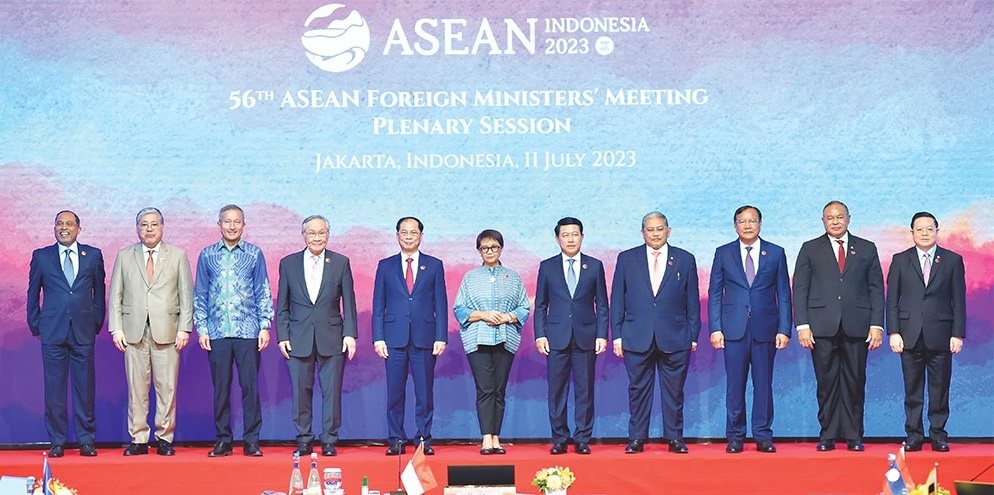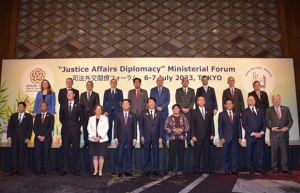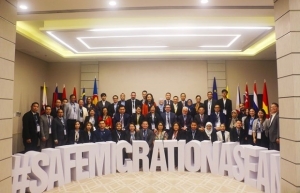Upgrade for ASEAN’s trade backbone set
 |
| The 56th ASEAN Foreign Ministers’ Meeting was held last week in Jakarta |
It is expected that from now until the year’s end, representatives from the Ministry of Industry and Trade (MoIT) and the Ministry of Planning and Investment will continue working with peers from the other nine ASEAN member states to discuss a new version of the ASEAN Trade in Goods Agreement (ATIGA) signed in 2009. The updated deal will be among a slew of solutions for ASEAN to expand their trade and investment ties.
“The upgraded agreement is expected to be signed in 2024,” a representative from the ASEAN Department under the Ministry of Foreign Affairs told VIR.
An upgrade trade negotiating committee has been set up to intensify negotiations in accordance with the ATIGA Upgrade Negotiations Work Plan.
“We noted the progress of the ATIGA upgrade negotiations which is targeted to be comprehensive in scope and cover not only traditional trade-in-goods elements but also emerging and future issues to ensure that the upgraded ATIGA will be a modern, comprehensive, forward-looking agreement relevant to business communities and more responsive to regional and global developments,” stated the joint communiqué of the 56th ASEAN Foreign Ministers’ Meeting organised last week in Indonesia which acts as ASEAN chair this year.
The EU-ASEAN Business Council has proposed that regarding trade liberalisation under the ATIGA, specific measures should be explicitly included on the tariff-free treatment of reused, recycled, repaired and remanufactured goods to speed up movement to a circular economy in ASEAN.
“Remaining tariffs on some goods in some member states should be further eliminated to bring the agreement on par with other agreements that have been entered into subsequently,” the council said.
In another case, in the chapter on trade facilitation, it is recommended that improvements should include specific and enforceable deadlines for the further expansion of the ASEAN Single Window to include all documentation needed for the import or export of goods.
Also, it is needed to include a provision for simplified clearances for low-value shipments; include a commitment to move to full paperless systems for customs and other documentary requirements; and include provisions to enhance dialogue and consultation with the private sector. There is also a need to include more specificity in the chapter on enhancing trade facilitation in the region.
Under the ATIGA’s existing commitments, ASEAN member nations vowed to remove tariffs to 98.6 per cent out of the total goods and products in 2021.
The agreement is the backbone of ASEAN economic integration. According to the MoIT, the new deal will help remove many barriers, making it more favourable for Vietnam to expand trade and investment ties with regional economies. In fact, the implementation of regional economic commitments including the ATIGA has benefited many enterprises in Vietnam as the import tariffs of products into regional markets have almost been removed so far.
For example, since last year, TH Group has marketed more than 30 product lines - including milk, foodstuffs, and organic agricultural products - in Singapore thanks to reduced tariffs. TH Group and Singapore’s HAO Mart have forged strategic ties on consuming and promoting these products in Singapore.
“All world-class brands have set foot in Singapore, so now is our presence in this market, which will then be expanded to Malaysia and other nations to benefit from reduced tariffs and high purchasing power,” said Hoang Thi Thanh Thuy, director of International Marketing at TH Group.
According to the MoIT, TH Group is among many big enterprises in Vietnam that have been boosting exports to regional markets. In the first half of this year, total exports turnover from Vietnam to other regional economies is estimated to hit 16.3 billion – and companies in Vietnam used an estimated $20.3 billion to import goods from these markets.
The MoIT has coordinated with the Ministry of Finance’s General Department of Vietnam Customs to successfully connect with the ASEAN Single Window, an environment that connects and integrates the national single window of each ASEAN member state which significantly expedites cargo and promotes ASEAN economic integration.
Additionally, Vietnam has also exchanged the electronic certificate of origin with the D form with nine regional nations. In 2022, the total number of e-dossiers exchanged with these nations was about 250,000.
Denny Abdi, Ambassador of Indonesia to Vietnam, said that the implementation of regional commitments under deals like the ATIGA offer Indonesian companies opportunities to export goods to and invest in Vietnam.
He said that over the past five years, there has been a 9.77 per cent increase in bilateral trade. He cited the General Department of Vietnam Customs as reporting that total trade between Indonesia and Vietnam reached $14.17 billion in 2022, up by 23.04 per cent from $11.5 billion in 2021.
“Regarding investment, Indonesia considers Vietnam’s position as strategic for the enhancement of mutually beneficial economic cooperation. In recent years, Indonesian investors have increasingly been interested to invest in Vietnam,” Ambassador Abdi said.
According to Vietnam’s Ministry of Planning and Investment, as of June 20, total registered investment capital from ASEAN in Vietnam hit $101.87 billion, including Singapore ($73.43 billion), Thailand ($13.1 billion), Malaysia ($13 billion), Brunei ($945.4 million), Indonesia ($645 million), the Philippines ($607.7 million), Laos ($71.1 million), and Cambodia ($69.8 billion).
Regional member states have also agreed that they should adopt a holistic approach to building a competitive funding environment, which will allow them to woo more foreign direct investment (FDI) within the bloc and from its partners of China, Japan, South Korea, Australia, and New Zealand.
Such facilitation should incorporate business and other measures not limited to foreign investment procedures alone. Synergies should be sought between related efforts and the activities and tools of authorities other than investment promotion agencies, the members agreed.
It should also cover business registration and approvals, licences, and other administrative requirements and processes, and tax-related and social security procedures, for example.
 | ASEAN, G7 foster judicial cooperation The ASEAN-G7 Justice Ministers' Interface convened in Tokyo, Japan on July 7, aiming to foster cooperation among the Association of Southeast Asian Nations (ASEAN) and the Group of Seven (G7) countries in the field of law and justice. |
 | ASEAN, EU join hands in protecting labour migrants in Southeast Asia The 2nd ASEAN-EU Dialogue on Safe and Fair Labour Migration and the launch of awareness-raising campaign videos for the ASEAN Safe and Fair Migration Campaign, held in the Philippines on July 4-7, brought together over 70 policymakers, practitioners, and representatives of civil society and international organisations. |
What the stars mean:
★ Poor ★ ★ Promising ★★★ Good ★★★★ Very good ★★★★★ Exceptional
Related Contents
Latest News
More News
- France supports Vietnam’s growing role in international arena: French Ambassador (January 25, 2026 | 10:11)
- Foreign leaders extend congratulations to Party General Secretary To Lam (January 25, 2026 | 10:01)
- Russian President congratulates Vietnamese Party leader during phone talks (January 25, 2026 | 09:58)
- Worldwide congratulations underscore confidence in Vietnam’s 14th Party Congress (January 23, 2026 | 09:02)
- Political parties, organisations, int’l friends send congratulations to 14th National Party Congress (January 22, 2026 | 09:33)
- 14th National Party Congress: Japanese media highlight Vietnam’s growth targets (January 21, 2026 | 09:46)
- 14th National Party Congress: Driving force for Vietnam to continue renewal, innovation, breakthroughs (January 21, 2026 | 09:42)
- Vietnam remains spiritual support for progressive forces: Colombian party leader (January 21, 2026 | 08:00)
- Int'l media provides large coverage of 14th National Party Congress's first working day (January 20, 2026 | 09:09)
- Vietnamese firms win top honours at ASEAN Digital Awards (January 16, 2026 | 16:45)

 Tag:
Tag:



















 Mobile Version
Mobile Version